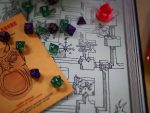The time has come. Your “Betrayal at the House on the Hill” board game has been sitting on your shelf collecting dust. Your friend is over, and after raving about the game for months now, you’re finally going to play it. Biting your lip in anticipation, you take the game off the shelf and remove the lid. You glance at the rule book and see that the game requires three to six players. In that moment, your hopes crumble faster than a piece of dry chocolate cake.
Board game enthusiasts are all too familiar with this struggle. Not only is it challenging to find a time when your whole friend group is free, but it can be difficult to find friends that share your passion. Sometimes, all you can scrounge up is one friend.
However, board games often require, or at least recommend, more than two players. But rejoice my fellow board game geeks — there are plenty of games that can not only be played with a mere two players, but are also more fun than playing with a larger crowd.
1. Pursuit of Happiness
One of my favorite games as a child was Milton Bradley’s “Life.” I reveled in becoming a pop star, buying a cozy Tudor-style home and placing the little blue and pink pegs in my red car to represent my slightly less famous husband and two daughters. Replaying “Life” as an adult, I came to the depressing realization that my favorite board game was rather boring. The game relies mostly on luck, which levels the playing field for a variety of ages, but makes playing less engaging.
Last year I spotted “Pursuit of Happiness” in a local game shop. The game allows players to live out whatever life they choose, while using strategy and allocating resources. Progressing from adolescence to old age, players take on projects, buy items, select a partner (or multiple, if they’re into that) and acquire a job in a quest to round up the most lifetime happiness points before they kick the proverbial bucket.
2. Unusual Suspects
This twist on the classic “Guess Who” is easy to pick up and is an exercise in hidden perceptions. “Unusual Suspects” casts one player as a witness who knows which colorful character committed the crime, and the other as a detective, who must ask questions in order to eliminate suspects.
The questions range from “Do they watch Fox News?” to “Do they eat off paper plates?” and rely completely on the character’s appearance. The party game doesn’t inherently encourage biases, but allows users to detect their friend’s. All players win when detectives are able to get inside the mind of the witness to determine which culprit is guilty.
3. Harry Potter Hogwarts Battle
Potterheads, your destiny awaits you. This cooperative, deck-building game allows players to take on the role of familiar characters and work together to defeat evil forces, including He-Who-Must-Not-Be-Named.
Players collect spells, magical items and allies to add to their deck to then use on enemies. The board game covers the first seven years of Hogwarts and becomes increasingly difficult. I encourage grabbing your Hogwarts house-themed blanket and some butterbeer before getting your wands ready.
4. Sherlock Holmes: Consulting Detective
It’s elementary, my dear reader. You likely know of Sherlock — either from Conan Doyle’s literary works, Robert Downey Jr.’s film portrayal or Benedict Cumberbatch’s depiction on BBC. If you’re a fan of Holmes’ unorthodox ways, or simply enjoy cracking cases, this text-heavy game is an excellent choice.
Not so much a board game as it is an interactive fiction experience, “Sherlock Holmes: Consulting Detective” instructs players to team up to solve a series of 10 cases. Armed with a phone directory, a map of London and some newspapers, players choose which leads to follow in the casebook. The ultimate goal is to solve the game in less turns than the great detective himself.
As a non-competitive person, I suggest exploring every lead you wish and ignoring Holmes’ score. After all, someone went to the trouble to write out each interaction — you might as well read them.
5. Hive
This complex board game involves strategically placing varied insect tiles to ultimately trap the opponent’s queen. So, essentially, it’s chess with bugs.
Much like chess, the rules take a while to pick up since each piece has different movement abilities. Unlike chess, there is no board, as the pieces themselves make up the board when they are placed.
6. Forbidden Island
If you and your partner are likely to unleash expletives when competing in “Mario Kart,” working together to escape a deserted island might prove therapeutic. In this tile-based game, players find themselves on a slowly sinking island, tasked with collecting four exquisite treasures and getting airlifted to safety before they succumb to drowning.
“Forbidden Island” is a watered-down (pun fully intended) version of its more popular cousin, “Pandemic,” also designed by Matt Leacock. But the eye-catching artwork and simple gameplay make the former stand out. Also, there’s something super satisfying about being able to physically hold the four colorful statues in your hands.
7. Gloom
Although technically a card game with quirkily pleasant art, “Gloom” will appeal to those with a penchant for storytelling. The goal is simple: you want your family to wallow in misery, and your opponent’s family to experience repulsive happiness. The less happy a family member is at the time of their death, the better.
The game is played by placing translucent modifier cards over the Addams-Family-like characters, either increasing or decreasing their happiness. As the gameplay is simple and repetitive, the most important facet of “Gloom” is the storytelling. It’s not enough to declare that little Anna the gothic ballerina was mauled by a bear near the train — you must explain how and why such a gloriously tragic event befell her.
A duo controlling rival families is sure to have fun concocting anecdotes and detailing the macabre escapades of their demented families.

















